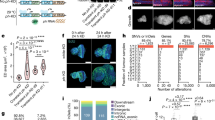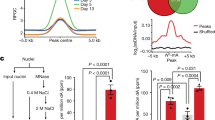Abstract
Ensuring precise DNA replication and chromosome segregation is essential during cell division in order to provide genomic stability and avoid malignant growth. Proteolytic control of cell cycle regulators by the anaphase-promoting complex, activated by Cdh1 (APCCdh1), is responsible for a stable G1 phase after mitotic exit allowing accurate preparation for DNA replication in the following S phase. APCCdh1 target proteins are frequently upregulated in tumor cells and the inactivation of human Cdh1 might interfere with genome integrity by target stabilization. Here we show that APCCdh1 is required for maintaining genomic integrity in primary human cells. Lentiviral-delivered strong and stable suppression of Cdh1 by RNA interference (RNAi) causes aberrant accumulation of several APCCdh1 target proteins, such as cyclin A, B, Aurora A or Plk1, which control accurate and equal distribution of the genetic information to daughter cells. This induces a premature and prolonged S phase, mitotic-entry delay and defects in chromosome separation and cytokinesis. Cell cycle deregulation by stable knockdown of Cdh1 leads to activation of p53/p21 and genomic instability, which is further increased by codepletion of p53. Thus, stabilization of APCCdh1 targets may initiate aberrant DNA replication and chromosome separation, and trigger a p53 response by deregulating G1 in primary human cells.
This is a preview of subscription content, access via your institution
Access options
Subscribe to this journal
Receive 50 print issues and online access
$259.00 per year
only $5.18 per issue
Buy this article
- Purchase on Springer Link
- Instant access to full article PDF
Prices may be subject to local taxes which are calculated during checkout







Similar content being viewed by others
References
Bartkova J, Horejsi Z, Koed K, Kramer A, Tort F, Zieger K et al. (2005). DNA damage response as a candidate anti-cancer barrier in early human tumorigenesis. Nature 434: 864–870.
Bashir T, Dorrello NV, Amador V, Guardavaccaro D, Pagano M . (2004). Control of the SCF(Skp2-Cks1) ubiquitin ligase by the APC/C(Cdh1) ubiquitin ligase. Nature 428: 190–193.
Brummelkamp TR, Bernards R, Agami R . (2002). A system for stable expression of short interfering RNAs in mammalian cells. Science 296: 550–553.
Carmena M, Earnshaw WC . (2003). The cellular geography of aurora kinases. Nat Rev Mol Cell Biol 4: 842–854.
Carter SL, Eklund AC, Kohane IS, Harris LN, Szallasi Z . (2006). A signature of chromosomal instability inferred from gene expression profiles predicts clinical outcome in multiple human cancers. Nat Genet 38: 1043–1048.
Christophorou MA, Ringshausen I, Finch AJ, Swigart LB, Evan GI . (2006). The pathological response to DNA damage does not contribute to p53-mediated tumour suppression. Nature 443: 214–217.
Cimini D, Howell B, Maddox P, Khodjakov A, Degrassi F, Salmon ED . (2001). Merotelic kinetochore orientation is a major mechanism of aneuploidy in mitotic mammalian tissue cells. J Cell Biol 153: 517–527.
Cross FR . (2003). Two redundant oscillatory mechanisms in the yeast cell cycle. Dev Cell 4: 741–752.
Diffley JF . (2004). Regulation of early events in chromosome replication. Curr Biol 14: R778–R786.
Dull T, Zufferey R, Kelly M, Mandel RJ, Nguyen M, Trono D et al. (1998). A third-generation lentivirus vector with a conditional packaging system. J Virol, 846–8471.
Efeyan A, Garcia-Cao I, Herranz D, Velasco-Miguel S, Serrano M . (2006). Tumour biology: policing of oncogene activity by p53. Nature 443: 159.
Ekholm-Reed S, Mendez J, Tedesco D, Zetterberg A, Stillman B, Reed SI . (2004). Deregulation of cyclin E in human cells interferes with prereplication complex assembly. J Cell Biol 165: 789–800.
Gorgoulis VG, Vassiliou LV, Karakaidos P, Zacharatos P, Kotsinas A, Liloglou T et al. (2005). Activation of the DNA damage checkpoint and genomic instability in human precancerous lesions. Nature 434: 907–913.
Hagting A, Den Elzen N, Vodermaier HC, Waizenegger IC, Peters JM, Pines J . (2002). Human securin proteolysis is controlled by the spindle checkpoint and reveals when the APC/C switches from activation by Cdc20 to Cdh1. J Cell Biol 157: 1125–1137.
Hahn WC, Weinberg RA . (2002). Rules for making human tumor cells. N Engl J Med 347: 1593–1603.
Harper JW, Burton JL, Solomon MJ . (2002). The anaphase-promoting complex: it's not just for mitosis any more. Genes Dev 16: 2179–2206.
Hoeller D, Hecker CM, Dikic I . (2006). Ubiquitin and ubiquitin-like proteins in cancer pathogenesis. Nat Rev Cancer 6: 776–788.
Hoffelder DR, Luo L, Burke NA, Watkins SC, Gollin SM, Saunders WS . (2004). Resolution of anaphase bridges in cancer cells. Chromosoma 112: 389–397.
Lehman NL, Verschuren EW, Hsu JY, Cherry AM, Jackson PK . (2006). Overexpression of the anaphase promoting complex/cyclosome inhibitor Emi1 leads to tetraploidy and genomic instability of p53-deficient cells. Cell Cycle 5: 1569–1573.
Lengronne A, Schwob E . (2002). The yeast CDK inhibitor Sic1 prevents genomic instability by promoting replication origin licensing in late G1. Mol Cell 9: 1067–1078.
Lindon C, Pines J . (2004). Ordered proteolysis in anaphase inactivates Plk1 to contribute to proper mitotic exit in human cells. J Cell Biol 164: 233–241.
Meraldi P, Honda R, Nigg EA . (2002). Aurora-A overexpression reveals tetraploidization as a major route to centrosome amplification in p53−/− cells. EMBO J 21: 483–492.
Morgan D . (1999). Regulation of the APC and the exit from mitosis. Nat Cell Biol 1: E47–E53.
Morgenstern JP, Land H . (1990). Advanced mammalian gene transfer: high titre retroviral vectors with multiple drug selection markers and a complementary helper-free packaging cell line. Nucleic Acids Res 18: 3587–3596.
Nagao K, Adachi Y, Yanagida M . (2004). Separase-mediated cleavage of cohesin at interphase is required for DNA repair. Nature 430: 1044–1048.
Naito Y, Yamada T, Ui-Tei K, Morishita S, Saigo K . (2004). siDirect: highly effective, target-specific siRNA design software for mammalian RNA interference. Nucleic Acids Res 32: W124–W129.
Park KH, Choi SE, Eom M, Kang Y . (2005). Downregulation of the anaphase-promoting complex (APC)7 in invasive ductal carcinomas of the breast and its clinicopathologic relationships. Breast Cancer Res 7: R238–R247.
Peters JM . (2006). The anaphase promoting complex/cyclosome: a machine designed to destroy. Nat Rev Mol Cell Biol 7: 644–656.
Rajagopalan H, Jallepalli PV, Rago C, Velculescu VE, Kinzler KW, Vogelstein B et al. (2004). Inactivation of hCDC4 can cause chromosomal instability. Nature 428: 77–81.
Rape M, Kirschner M . (2004). Autonomous regulation of the anaphase-promoting complex couples mitosis to S-phase entry. Nature 432: 588–595.
Rape M, Reddy SK, Kirschner MW . (2006). The processivity of multiubiquitination by the APC determines the order of substrate degradation. Cell 124: 89–103.
Romero F, Gil-Bernabe AM, Saez C, Japon MA, Pintor-Toro JA, Tortolero M . (2004). Securin is a target of the UV response pathway in mammalian cells. Mol Cell Biol 24: 2720–2733.
Rubinson DA, Dillon CP, Kwiatkowski AV, Sievers C, Yang L, Kopinja J et al. (2003). A lentivirus-based system to functionally silence genes in primary mammalian cells, stem cells and transgenic mice by RNA interference. Nat Genet 33: 401–406.
Sigrist SJ, Lehner CF . (1997). Drosophila fizzy-related down-regulates mitotic cyclins and is required for cell proliferation arrest and entry into endocycles. Cell 90: 671–681.
Song MS, Song SJ, Ayad NG, Chang JS, Lee JH, Hong HK et al. (2004). The tumour suppressor RASSF1A regulates mitosis by inhibiting the APC-Cdc20 complex. Nat Cell Biol 6: 129–137.
Spruck CH, Won KA, Reed SI . (1999). Deregulated cyclin E induces chromosome instability. Nature 401: 297–300.
Sudo T, Ota Y, Kotani S, Nakao M, Takami Y, Takeda S et al. (2001). Activation of Cdh1-dependent APC is required for G1 cell cycle arrest and DNA damage-induced G2 checkpoint in vertebrate cells. EMBO J 20: 6499–6508.
Taguchi S, Honda K, Sugiura K, Yamaguchi A, Furukawa K, Urano T . (2002). Degradation of human Aurora-A protein kinase is mediated by hCdh1. FEBS Lett 519: 59–65.
Veelken H, Jesuiter H, Mackensen A, Kulmburg P, Schultze J, Rosenthal F et al. (1994). Primary fibroblasts from human adults as target cells for ex vivo transfection and gene therapy. Hum Gene Ther 5: 1203–1210.
Wang CX, Fisk BC, Wadehra M, Su H, Braun J . (2000). Overexpression of murine fizzy-related (fzr) increases natural killer cell-mediated cell death and suppresses tumor growth. Blood 96: 259–263.
Wang Q, Moyret-Lalle C, Couzon F, Surbiguet-Clippe C, Saurin JC, Lorca T et al. (2003). Alterations of anaphase-promoting complex genes in human colon cancer cells. Oncogene 22: 1486–1490.
Wäsch R, Cross FR . (2002). APC-dependent proteolysis of the mitotic cyclin Clb2 is essential for mitotic exit. Nature 418: 556–562.
Wäsch R, Engelbert D . (2005). Anaphase-promoting complex-dependent proteolysis of cell cycle regulators and genomic instability of cancer cells. Oncogene 24: 1–10.
Wei W, Ayad NG, Wan Y, Zhang GJ, Kirschner MW, Kaelin Jr WG . (2004). Degradation of the SCF component Skp2 in cell-cycle phase G1 by the anaphase-promoting complex. Nature 428: 194–198.
Zhou H, Kuang J, Zhong L, Kuo WL, Gray JW, Sahin A et al. (1998). Tumour amplified kinase STK15/BTAK induces centrosome amplification, aneuploidy and transformation. Nat Genet 20: 189–193.
Zur A, Brandeis M . (2001). Securin degradation is mediated by fzy and fzr, and is required for complete chromatid separation but not for cytokinesis. EMBO J 20: 792–801.
Acknowledgements
We thank F Cross, M Engelhardt, C Tsurumi and members of the laboratory for helpful discussions and critical reading of the manuscript and R Mertelsmann for continuous support. This work was supported by a grant from Deutsche Forschungsgemeinschaft (to RW).
Author information
Authors and Affiliations
Corresponding author
Additional information
Supplementary Information accompanies the paper on the Oncogene website (http://www.nature.com/onc).
Supplementary information
Rights and permissions
About this article
Cite this article
Engelbert, D., Schnerch, D., Baumgarten, A. et al. The ubiquitin ligase APCCdh1 is required to maintain genome integrity in primary human cells. Oncogene 27, 907–917 (2008). https://doi.org/10.1038/sj.onc.1210703
Received:
Revised:
Accepted:
Published:
Issue Date:
DOI: https://doi.org/10.1038/sj.onc.1210703
Keywords
This article is cited by
-
Efficient terminal erythroid differentiation requires the APC/C cofactor Cdh1 to limit replicative stress in erythroblasts
Scientific Reports (2022)
-
Crosstalk between Plk1, p53, cell cycle, and G2/M DNA damage checkpoint regulation in cancer: computational modeling and analysis
npj Systems Biology and Applications (2021)
-
Chk1-mediated phosphorylation of Cdh1 promotes the SCFβTRCP-dependent degradation of Cdh1 during S-phase and efficient cell-cycle progression
Cell Death & Disease (2020)
-
APC/CCdh1 regulates the balance between maintenance and differentiation of hematopoietic stem and progenitor cells
Cellular and Molecular Life Sciences (2019)
-
SUMO targets the APC/C to regulate transition from metaphase to anaphase
Nature Communications (2018)



